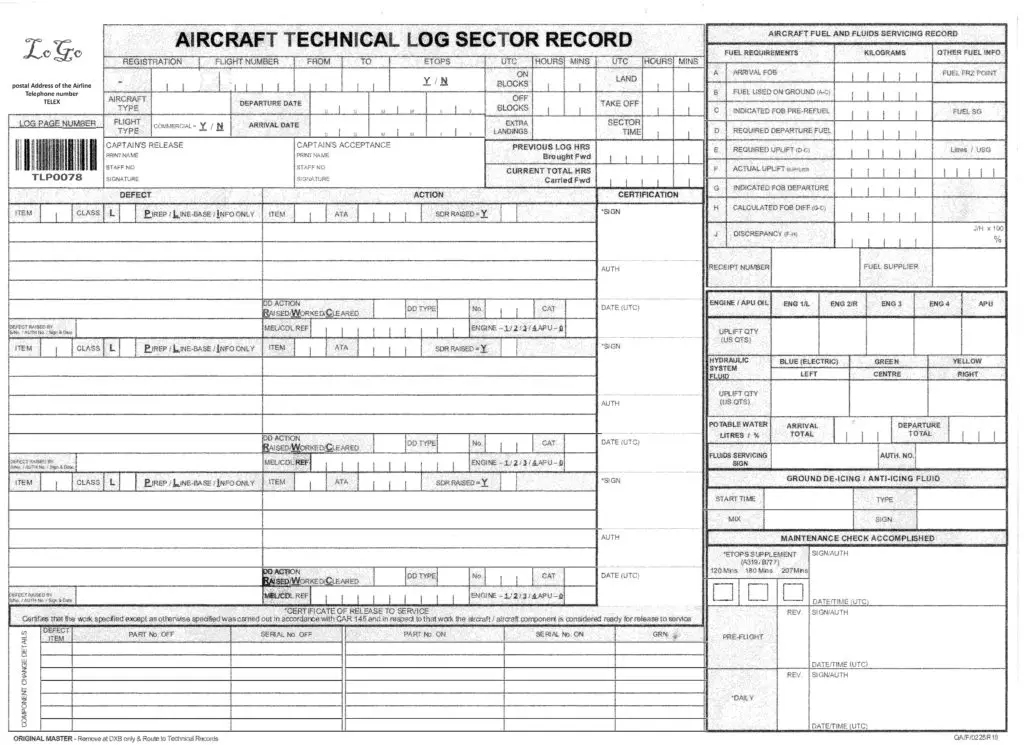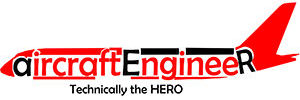Aircraft technical log also know as techlog or log book.
The aircraft technical log is the primary source for technical and operational data on each flight that occurs on an aircraft. This data includes defects and malfunctions, block times and fuel consumption. It also records all maintenance carried out on an aircraft between scheduled base maintenance visits.

Question:-
Describe the TECHNICAL LOG with your own word.
Answer:-
• Technical log is a document which shall contain all the information of the following:-
a. Title page with the registered name and address of the operator,
b.Type of aircraft and the full international registration marks.
c.Certificate of Maintenance Review.
d.Maintenance Statement of next inspection due.
e.A readily identifiable section containing sector record pages. Each page shall be Pre-printed with the Operator’s name and page serial number and shall make Provision for recording the following:
– The aircraft type and registration mark;
– The date and place of take-off and landing.
– The times at which the aircraft took off and landed.
– Particulars of any defect in any part of the aircraft affecting the airworthiness or Safe operation of the aircraft which is known to the Commander or, if no such defect is known to him, an entry to that effect.
• All Malaysian registered aircraft in either public transport or in aerial work category which has a certificate of airworthiness in force subjected to regulation 29(1), part V, chapter 2 of MCAR shall maintain a technical log.
• The technical log shall be kept by the operator of the aircraft and shall be kept for a period of two year until the aircraft is completely out of service or destroyed (regulation 86,part ix).
• The technical log shall be carried in the aircraft (regulation 82, part ix) and the duplicate of the technical log shall be kept by the operator of the aircraft on ground.
• It is the responsibility of the commander(pilot) to date and sign the completion of the following item in the technical log:-
1.Times when the aircraft take off and landed.
2.Any defect which may affects the airworthiness of the aircraft.
3.Other particulars in respect of the airworthiness or operation of the aircraft as the Director General may require.
4.The arrival fuel state.
5.A Certificate of Release to Service for which the defects has been eliminated.
6.The quantities of fuel and oil uplifted, and the quantity available in each tank,or combination of tanks, at the beginning of each flight.
7.The total hours of flying to determine the next inspection.
8.Provision for pre-flight and daily inspection signatures.
9.The times when ground de-icing was started and completed.
•All the entries above must be made by the pilot immediately upon termination of the flight except in the case of:-
-Consecutive flight on same day.
-Nothing drop or projected beginning and ending at the same aerodrome.
-If the same commander flying the same airplane, the entry can be made on the termination of the last flight. (if there is no defect have occurred on the previous flight).
•When there is additional information need to be added for a specific aircraft the Supplementary technical log will be required. Where the following few examples is required to be recorded.
-Maximum or intermediate contingency power.(duration of maximum or intermediate power usage and subsequently to transfer the information to the engine log book or maintenance record).
-Landings (Numbers of landing for undercarriage component life consideration).
-Flight pressure cycle (Numbers of pressure cycles for fuselage life consideration.).
•The supplementary technical log information shall be assessed by the operator and approved by DCA.
References:
– BCAR Section A, Sub-Section A7-8 Page 1.
– MCAR (Regulation 29(1), part V, chapter 2).
(Regulation 82, part ix).
(Regulation 86, part ix).
– Air legislation, instructor note.
– Instructor’s slide show.
